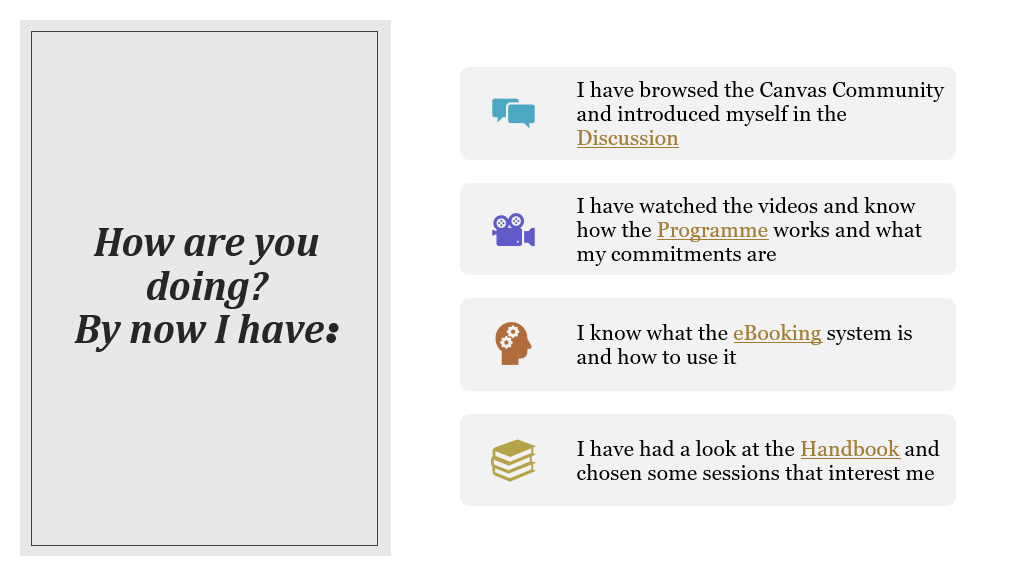Dr Laura Leonardo
Director of HaSS Faculty Research Training Programme
Faculty of Humanities and Social Sciences
What did you do?
This case study concerns stage 1 PGR students in the HaSS faculty, and how staff and students were able to build a purposeful peer support network.
How did you do it?
The support network was established in September 2020 to support new PhD students during lockdown, with a focus on keeping students on track with their induction progress and helping to reduce the isolation students were feeling. Many students were studying from abroad or were spending their first months in Newcastle isolated in student halls and, while Student Union societies already exist to boost the social aspect of studying at Newcastle, it was felt that there could be some more curriculum-linked support activities to bolster community and to help students stay connected and on track.
Students were invited to sign up to be included in these groups and were then assigned to deliberately mixed groups to reflect the programme’s cross-disciplinary approach. There was a high rate of take up which meant eight small groups of ten or twelve could be established.
The activities centred around five scheduled Zoom calls, each with a focus on a particular aspect of the programme. These sessions ran until the Christmas break, with more frequency at first to facilitate students’ induction, and then less often to allow students to get on with their own project while being assured of a scheduled checkpoint. Topics and discussion points were set and addressed common worries or issues that may be being experienced at each stage of the course, for example, one session focused on how students could select the research training that best suited their goals.
The Zoom sessions were run by later-stage research students (TAs), who could empathise and share their experiences with the new starters. Though the groups were run by these TAs, this year, faculty members created the skeleton agendas and materials for each session. The TAs were then able to field queries and report back to faculty members when needed or where appropriate. The TAs are paid for their time (some budget became available due to the lack of catering and photocopying needed this year, and payments are managed via JobsOC), and receive training and experience, which adds to the appeal for students to sign up. Assignments like these can be a valuable addition to their CV.
“I too as a PGR came to realise a lot of things facilitating it such as the importance of planning and getting certain things done on our first years.”
Teaching Assistant
Over 55% of participants said they would like to continue attending these sessions, so groups will run again with January starters and continue for anyone who still finds them useful, with the now experienced TAs given the added responsibility of producing the session materials themselves. In this way, the support system can become more self-sustaining and will not cause a large increase in workload for faculty members.
As this support system is peer-based and not linked to the official system of course reps or run by faculty members, it means that students can feel a little more relaxed about mentioning problems or things they are struggling with.
“I think the peer support has offered a comfortable space for PGRs to express their feelings, needs, frustrations and wishes. During the lockdown, it offered an opportunity for everyone to connect and learn from each other.”
Teaching Assistant
The small-group nature of the sessions can also relieve some pressure in terms of not having to speak up in front of a large group. Breakout rooms were regularly used within the sessions to facilitate everyone’s involvement. In effect, these sessions can help students feel less alone in their struggles and help them build their personal in-course networks.
“I think the peer pastoral support groups have provided PGRs with a safe, friendly, and warm space to seek guidance and much-needed connection.”
Teaching Assistant
Feedback from those who had used the groups was very good, and highlights for students included that they appreciated meeting other students and practicing their language skills, as well as the pastoral and curriculum outcomes envisaged. Signups for the next series of events is already underway and students are once again responding well to this invitation.
“My experience as one of the TAs facilitating these groups has been very fulfilling overall, and I have learned important lessons relevant to my own PGR journey by helping others at the onset of theirs.”
Teaching Assistant
In contrast, students have not responded as positively to the Teams team that was set up for the module. Engagement in this was generally rather low, and, as students didn’t have any other reason to access the software, for some, this became a little annoying to check as it created another avenue of communication. As well as this, some students felt uncomfortable with asking for support or sharing their feelings with ‘strangers’ in Teams. It would appear that for this group, the semi-structured small group synchronous video calls were much more valuable and effective. Should a non-synchronous solution be sought, Canvas Communities offer an alternative to a Teams channel, and as students are already in Canvas for other reasons, this might boost engagement there.
“If only 10% of the students have benefited, it is still worth doing.”
Overall, the peer support groups have been very effective for students who needed them. For a relatively small time and budget investment, the students have been able to benefit from connecting with their peers and establishing themselves as part of a community while studying under challenging circumstances.
Resources
Contacts
Director of HaSS Faculty Research Training Programme

